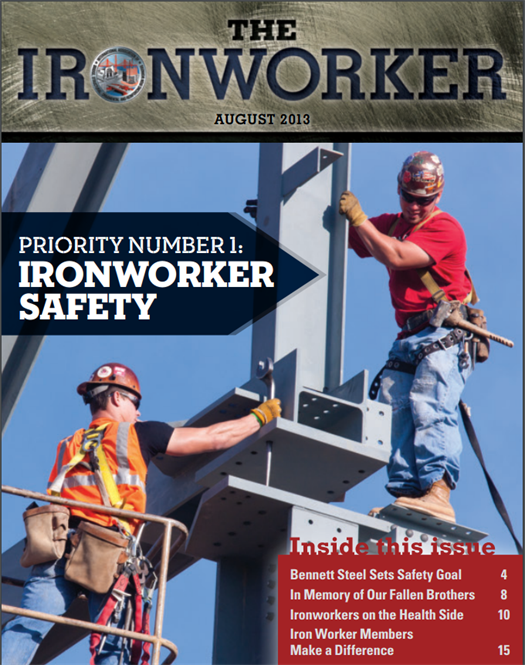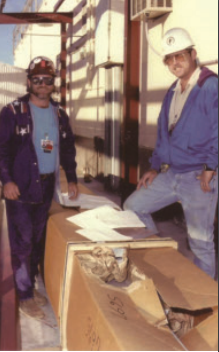
 Harry Carver, right, with his late friend,
Harry Carver, right, with his late friend,
Donny McDaniels, Local 709 (Savannah, Ga.)
members at the Savannah River site.
“I feel fortunate for the cancer I got,” expressed ironworker John Hall. While such words would be astonishing to most people, Hall meant what he said. He had worked for decades on the Savannah River site, one of many Department of Energy (DOE) sites that produce nuclear weapons, and he had lost a friend who had worked right alongside him to lung cancer. “Donny McDaniels and I were working right next to each other when he began having coughing fits and complaining of back pain,” Hall said, describing how his friend realized something was wrong.
Harry Carver, also a good friend of Donny, shared in this very difficult experience. “By the time he found out, it was too late,” explained Carver. “In January (2001), the doctor told Donny he had lung cancer. By March, he was gone.” After that experience, Hall and Carver, both having been diagnosed with cancer themselves, are grateful just to be alive. Hall and Carver, both members of the Local 709 (Savannah, Ga.), worked in the same crew with Donny for much of the time they were on the site. As one can imagine, they are constantly concerned about their health. “There was all kinda stuff out there,” tells Carver. “Silica. Beryllium. Asbestos. And you don’t know how much your life’s been cut short because of it.” So when they heard that the Building Trades National Medical Screening Program (BTMed) offers free medical screenings to former construction workers of DOE sites, they participated in the program. “I saw it was available and wanted to make sure I didn’t have anything wrong with me,” Carver says. “Anybody who worked out there needs to do the same. That’s why I encourage everybody I do know to get screened.”
The BTMed has been providing these screenings to DOE construction workers since 1997 and currently serves 23 DOE sites. The screening Hall and Carver received is an easy process consisting of two steps: a work history interview and a medical exam. In step one, a specially trained building trades worker or work site expert conducts a work history interview to determine what exposures to hazardous material the former worker may have had and the types of illnesses that could result. In step two, former workers receive a free medical screening examination to test for illnesses that may have developed from exposure risks, as well as other health problems. Following the exam, the participant receives a letter indicating any medical findings and indicates which findings could be work related.
“The physical was really thorough. You get tested out and they’ll let you know right there if you got anything to look out for,” Carver says of the exam. And after losing a friend, Carver knows the importance of getting his health examined regularly. But perhaps Hall put it best as he reflected on his friend’s death and his own illness by saying, “You feel it’s something that’s not gonna happen to you until it does.” The BTMed Program is coordinated by CPWR – The Center for Construction Research and Training and supported by the Building & Construction Trades Department of the AFL-CIO. If you have worked at one of the covered DOE/AEC sites listed on the banner, please contact the Building Trades National Medical Screening Program at 1-800-866-9663 or www.btmed. org. Special thanks to Pete Stafford, executive director for the Center for Construction Research and Training, and his efforts to help our Local 709 members to prevent workplace health illnesses.